What You Need to Know About the 2018 Government Shutdown
February 4, 2018
In mid January, the government shut down for nearly three days. This has been the first shutdown since 2013, when the government closed for 16 days altogether.
What exactly is a government shutdown? Exactly what it sounds like. Much of the government is funded by an annual budget that is decided by congress. If the legislation that decides the budget isn’t passed by a certain deadline, the government shuts down. Unfortunately, Congress couldn’t find equal ground on the subject by the deadline–Friday 19 by midnight–so therefore the government closed. Hundreds of thousands of “non-essential” federal workers were sent home without pay–which is known as an unpaid furlough. During the last shutdown, 850,000 employees were furloughed.
Why did the government shut down in the first place? That is a question that has been severely debated for the past few weeks. Democrats blame Republicans for the shutdown and vice versa. The main issue that divided these parties was DACA, the Deferred Action for Childhood Arrivals.
DACA is an Obama-era immigration policy that allows undocumented immigrants under the age of 16 to apply for protection from deportation. After a background check, these individuals are eligible to get renewable two-year permits to work and study in the US. When the policy went into effect in 2012, roughly 800,000 people were protected. By the time the Trump administration announced its end in September 2017, that number had dropped to 700,000. Congress had six months to negotiate a deal, if they wanted DACA to be saved.
The Democrats have since announced their displeasure at the possible end of DACA. Democratic Sen. Elizabeth Warren stated that the government “promised” DACA recipients that they would not be deported.
“We promised to protect the 800,000 DACA recipients from deportation,” she said, “America should keep it’s promises, and if President Trump doesn’t know that, then Congress must pass legislation to make the DACA program permanent.”
Senate Minority Leader Chuck Schumer, a New York Democrat, also announced his disapproval. He said in a statement that the decision to end DACA will rip apart families.
“Most Americans know how heartless the DACA decision is ripping apart families and telling people who have worked hard to become Americans for years that they have to leave the country,” he stated, “The human and economic toll of rescinding DACA will be far reaching and Democrats will do everything we can to prevent President Trump’s terribly wrong order from becoming reality.”
And according to Republicans, the President himself included, the Democrats are in fact doing everything in their power. President Trump offered Congress a deal–the U.S. could still have DACA if they would accept a bill that would use $33 billion dollars to fund border security and enforcement for ten years (aka, the Wall).
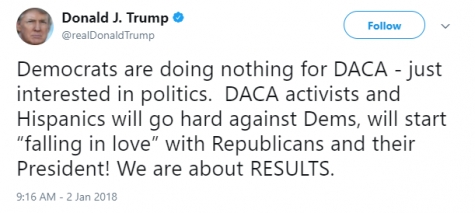
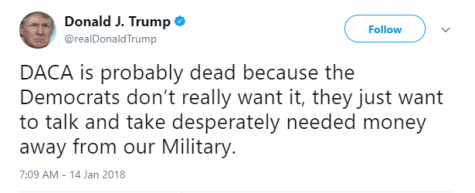
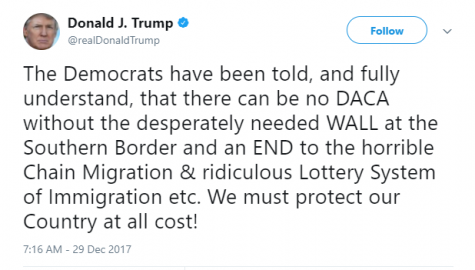
Not only did they have to negotiate terms on DACA and the wall, Democrats had to consider CHIP, which lapsed September 30 of 2017, as well.
CHIP, the Children’s Health Insurance Program, is program that provides millions of minors with healthcare coverage, even if their parents lack insurance of their own. These children are able to have routine checkups, immunizations, dental care, and other emergency services thanks to CHIP.
The children’s health insurance measure was included in the funding extension deal and many Republicans, including Senate Majority Leader Mitch McConnell, grew worried that Democrats would not fund CHIP and would prefer to fund DACA (and therefore cause a government shutdown) instead.
“We need to shut down the government and not fund children’s health insurance? That’s a pretty bad argument,” House Energy and Commerce Chairman Greg Walden said, “They know in their hearts that a ‘yes’ vote is the right vote.”
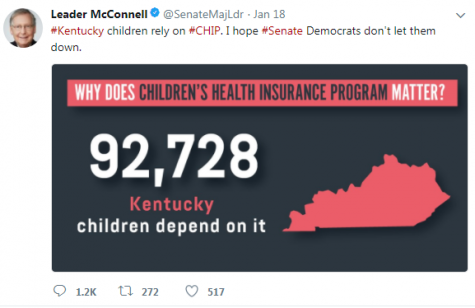
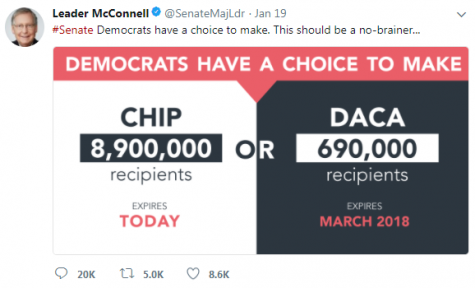
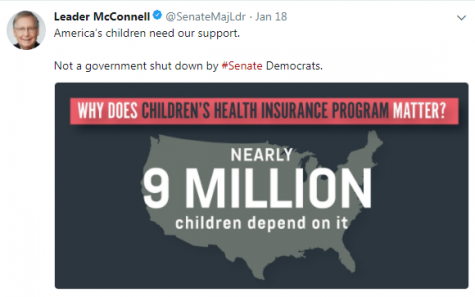
Republicans weren’t the only ones to blame the other side. Democrats did it as well. Schumer accused the Republican-controlled White House and Congress of preventing a compromise.
“Under this unified control it was the Republicans’ job to govern, it was their job to lead. It was their job to reach out to us and come up with a compromise. They have failed,” he said.
“I essentially agreed to give the president something he said he wants in exchange for something we both want,” Schumer also stated, “This is the Trump shutdown. Only President Trump can end it. We Democrats are at the table, ready to negotiate. The president needs to pull up a chair and end this shutdown.”
The shutdown may have been short and sweet, but Congress can do all of this again in four days, as a bill was passed that only funded the government until February 8. If an agreement isn’t made by that date, then we can all expect a government shutdown that may last longer than the last one.




